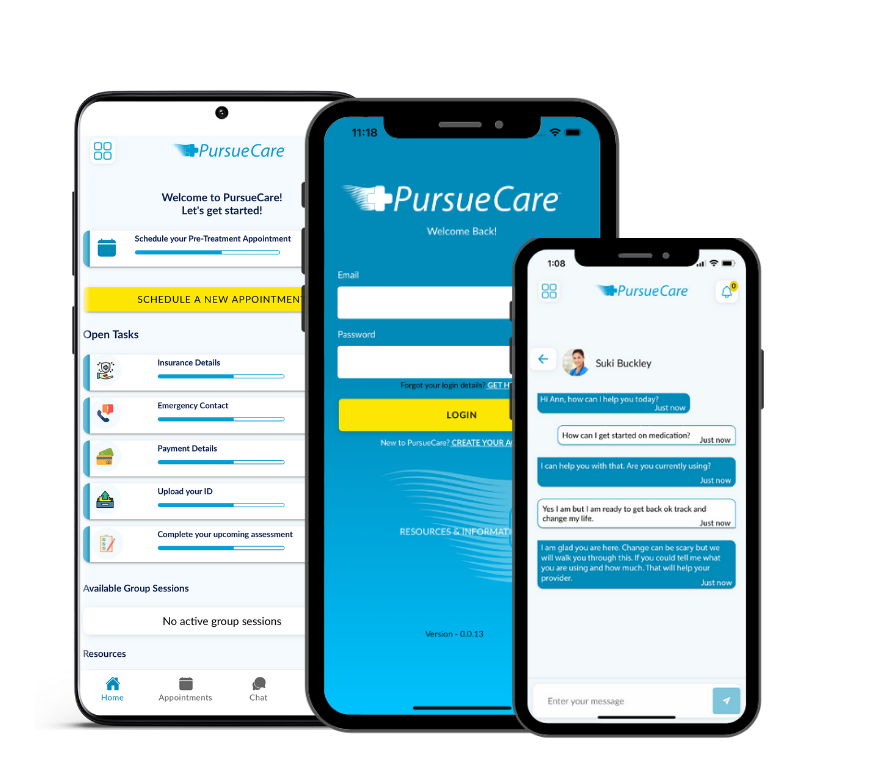You've got questions? We've got answers.
A lot of questions can come up when using a new platform for care.
We've put together a list of questions that are frequently asked by patients to help you understand our service, how to access care, and to help get you started.
PursueCare is a provider of addiction treatment and behavioral health services through telemedicine.
PursueCare treats patients that have Substance Use Disorder (SUD), exhibit symptoms of possible dependence, or may be at risk for SUD. PursueCare also treats patients with co-occurring mental and behavioral health disorders, or those in need of therapy or psychiatric medication management.
PursueCare treats:
- Substance Use Disorder (Opioids, alcohol, benzodiazepines, and methamphetamines)
- Co-occurring and generalized behavioral health (need for addiction counseling and/or therapy)
- Co-occurring and generalized mental disorders (need for therapy and/or psychiatry care) such as:
- Depression, bipolar, and other mood disorders
- Anxiety disorders
- Personality disorders
- PTSD
- Some psychotic disorders
Services can be broken down into four core categories that may work together for a comprehensive approach, or may fill specific needs of the patient:
- Medication-Assisted Treatment for SUD (most frequently Opioid Use Disorder)
- Addiction Counseling and Behavioral Therapy (including pre-screening and assessment)
- Psychiatric Medication Management
- Mail-Order Pharmacy Services
All PursueCare patients start by registering on the smart phone app or with the patient sign up form on the website. Patients should have their insurance card and a photo ID available, but neither are required to start an evaluation. Any identification is sufficient, PursueCare does not need legal residency or other documentation to get started.
PursueCare will establish the patient in care through care coordinators that introduce and help patients to navigate their treatment. Patients can also get started on their own through the easy-to-follow instructions in the smart phone app.

Getting Started
If you or your loved one are experiencing any of the following call 911 immediately:
- a medical emergency
- a suspected overdose
- at risk of severe harm to self or others
- trouble breathing or other respiratory issues
If you or your loved one are experiencing a suspected opioid overdose and have naloxone (Narcan) available, call 911 immediately and then administer the naloxone to the person following all manufacturer instructions for safe use. A second dose may be required if the person is still unresponsive after 2-3 minutes. Note that effects of naloxone are temporary and immediate medical attention is necessary. Calling 911 is always the first course of action.
For more info on overdose response visit: https://harmreduction.org/issues/overdose-prevention/overview/overdose-basics/responding-to-opioid-overdose/call-for-help/
For more info and confidential support for people in distress or at risk of suicide, contact the National Suicide Prevention Lifeline: 1-800-273-8255
Our Care Coordinators can help you get started with treatment, assist with insurance coverage and payment options, and answer any questions you may have during treatment. You can reach us a number of ways:
Phone: (866) 744-1930
Email: care@pursuecare.com
Chat: Chat with us right from the app by clicking on the chat window at the bottom of this page.
If you are new to treatment and have not received an assessment from a counselor that referred you to our care, your first session will likely be with a PursueCare counselor.
During that session, the counselor will ask questions to find out more about your unique needs. He or she may ask confidential questions about:
- Why you are seeking treatment.
- If you are currently in crisis, or having feelings or thoughts about suicide.
- What substances you are currently using or have used in the past.
- How often you use substances.
- The good and bad effects of those substances on your life, relationships, work, and child care (if applicable).
- How day-to-day life is affected by your substance use.
- If you feel you are suffering from any other emotional or behavioral issues, such as depression or anxiety.
- If you have received treatment in the past, or ever previously been in recovery.
- Your understanding of treatment, and what it entails. Past medical history, current medications, family and social history.
You can access treatment from most tablets the same way that you would with the app on your phone.
You can access upcoming sessions, edit personal information and insurance/payment information, and schedule sessions with your connected providers through any web browser at portal.pursuecare.com. The portal will look a bit different than your app, so feel free to contact a care coordinator for assistance as needed.
When you see your doctor and counselor on your smart phone or computer, you don’t have to drive to travel to your healthcare providers as often. You can save money on transportation, and you don’t waste any time or risk running late for your appointment. You also don’t usually need to take extra time off work because you can see your doctor and counselor anywhere that offers sufficient privacy. So you can follow your doctor’s instructions, and get the support you need from your counselor, all without missing work, or wasting time and money.
You will also more often be able to schedule your sessions at the times of day that work for you. Because our providers often offer hours that normal clinics do not, such as nights and weekends, there is more flexibility to access care around your schedule.
Through PursueCare you will gain access to the best addiction treatment specialists licensed to provide care in your state. In some areas, quality treatment is hard to find locally. When there is a local treatment facility, it is often full. To make matters worse, some forms of treatment are not evidence-based, and, put simply, don’t work for most people. With PursueCare, high quality medication and counseling treatment comes to you. That means more specialists that can help you meet your recovery goals, no matter where you live.
Finally, and most importantly, PursueCare makes it possible to get better. When you are able to access doctors, counselors, and other treatment specialists as often as you need to, without all of the challenges of in-person care, you can spend more time and energy focused on your recovery and the other important things in life.
Under the Confidentiality Regulation, 42 Code of Federal Regulations (CFR) 2, personally identifiable health information relating to substance use and alcohol treatment must be handled with a higher degree of confidentiality than other medical information.
PursueCare adheres to all requirements for privacy, protection and secure handling of your personal Protected Health Information (PHI) required by HIPAA and applicable state and federal laws. HIPAA ensures strict industry-wide standards for how we handle healthcare information, billing, and information from your video visits. This means that our systems use fully encrypted data transmission and secure network and server connections. Your video is never recorded, saved, or stored on our servers or those of our Business Associates, so there is no chance that someone can later view your visit with your doctor or provider.
PursueCare will only share your PHI under certain circumstances, with other healthcare providers directly involved in your care, or with any others that you consent to share it with. You can review our Notice of Privacy Practices at: http://www.pursuecare.com/NOPP
In very rare circumstances, security protocols for any system, including ours, may fail. Such a failure might cause a breach of privacy or PHI. In the unlikely case that such a failure occurs, PursueCare will take all measures required to remedy the failure, and notify you of exactly what occurred, and what information was exposed, if any.
The privacy of your video sessions also depends on you:
We highly recommend attending your sessions in a safe and private setting, such as your home, that is free from distraction and where others cannot hear or see your session. In some cases, headphones can help to maintain privacy of what your doctor or counselor directs, recommends, or communicates to you.
We also recommend that you do not share your password with others that you do not want involved in your care. If you are concerned about password security you can change your password at any time from the Settings tab of the app, or ask for assistance from Technical Support at support@pursuecare.com.
Feel free to reach out to our Care Coordinators or contact Technical Support directly at support@pursuecare.com.
Receiving Care
PursueCare provides evidence-backed methods for treatment of Opioid Use Disorder (OUD) that are supported by the American Society of Addiction Medicine (ASAM), Substance Abuse and Mental Health Services Administration (SAMHSA), and other leading organizations advancing best practices in treatment.
Our programs are designed to reduce withdrawal, cravings, pain, and other symptoms of opioid and other substance use addiction, address behaviors that may contribute to addiction and relapse, and provide support for lasting recovery. The form of treatment PursueCare offers is often referred to as Medication-Assisted Treatment (MAT), or Medication and Counseling. This form of treatment combines treatment by licensed doctors that can prescribe medications like Suboxone, Buprenorphine, and Naltrexone, combined with counseling and therapy. Evidence shows that the combination of these forms of treatment in a care plan individually tailored for you can lead to lasting recovery.
MAT for OUD has been proven to be effective for:
- Improving chance of survival.
- Keeping individuals in recovery.
- Lowering opioid use, and activities that may lead to criminal justice involvement.
- Reducing risk of relapse.
- Enabling individuals to regain sense of control and “normalcy,” often supporting improved relationships, employment, childcare, and meeting life goals.
- Improving birth results in pregnant women suffering from OUD.
- Reducing risk of HIV, Hepatitis C, and other related health risks.
Source: https://www.samhsa.gov/medication-assisted-treatment/treatment#medications-used-in-mat
You will initially be required to submit to a toxicology screen at the outset of treatment. Our Care Coordinators or your providers will provide you with information about where to go locally for a urine toxicology screen, or how to complete a convenient screen at home with our saliva test kit.
Toxicology screens test for the presence of opioids and other substances in your body. The results of the screen are confidential. The results help to develop a treatment plan that is safe and effective.
Periodically during your treatment your doctor may ask you to submit to additional screens. Conducting periodic screens is often recommended in order to monitor substances for safety purposes, and to promote lasting recovery. They may also be required by state law and certain court-ordered programs (if applicable). The frequency of such screens is determined with you by your doctor.
You will always be asked prior to any screen about any current drug use or relapse. We believe that good treatment starts with trust, and we encourage you to truthfully relate your drug use or relapse so that we can safely and compassionately care for you. We will keep your screens and your answers to questions about your drug use or relapse confidential.
Every person is different, and we try to respect what makes you different. That requires us to conduct initial assessments to help determine exactly what type of care, and how much of it, you may need. From there, we form a treatment plan for the first 30-90 days that you have a chance to review with your providers, and sign off on. You are a part of determining your treatment, and we pledge to honor your needs and listen to your requests.
Many patients who are new to medication treatment and counseling often need to be seen once-per-week, or possibly even more often, at first. As treatment continues, you may not need as much care, or you might benefit from more counseling and fewer doctor visits. We find that once patients reach the “maintenance phase of treatment, once monthly treatment may be sufficient to monitor and adjust medications, benefit from the support of your counselor, and allow you to focus on other aspects of your life.
Recovery is a journey. While many can begin to taper down their recovery medications after 12-18 months, or possibly even sooner, others need support for longer, or more frequently. Our treatment professionals will make you a part of the decision-making process in your treatment. Because it all starts with trust.
A common misconception associated with medication to treat Opioid Use Disorder is that it substitutes one drug for another. You may have even heard this from 12-step and sobriety-based programs. This is not the case.
Instead, these medications relieve the withdrawal symptoms and psychological cravings that cause chemical imbalances in the body. Medication-Assisted Treatment (MAT) programs provide a safe and controlled level of medication to overcome the use of an abused opioid. And research has shown that when provided at the proper dose, medications used in MAT have no adverse effects on a person’s intelligence, mental capability, physical functioning, or employability. Source: https://www.samhsa.gov/medication-assisted-treatment/treatment#medications-used-in-mat
People may safely take medications used in MAT for months, years, several years, or even a lifetime. Plans to stop a medication must always be discussed with your doctor and included in your treatment plan.
Different medications work differently. Suboxone is a brand name for buprenorphine combined with naloxone. Suboxone, and its generic form, have a low potential for misuse because it contains the “partial agonist” of buprenorphine, along with an “antagonist” of naloxone which offsets the ability to misuse it.
Buprenorphine generally works by filling the receptors in the brain the same way as opioids like pain pills and heroin, but without the euphoric effect. It is what is referred to as a “partial agonist.” This means that it does cause a limited pleasurable affect, but only enough to stop withdrawal. That allows it to reduce withdrawal, cravings, pain, and other symptoms of opioid addiction, and patients often report feelings of normalcy and better health when regularly taking it.
Naloxone binds to receptors to help prevent misuse and respiratory effects of opioids, and even the unlikely misuse of buprenorphine.
Always consult with your PursueCare doctor and your CompreCare Rx pharmacist about the benefits and risks of medications for treating Opioid Use Disorder.
Read more about how opioids work in the brain on our blog.
PursueCare practices “harm reduction.” This means that we accept patients as they are. We know that addiction recovery is a journey. We know that entering treatment is an enormous positive step. And we know that people can experience setbacks along the way. That is why we try to keep you in our program, even after setbacks happen.
At PursueCare, we will never deny treatment if you are making an effort to follow the direction of your doctor, regularly make your appointments, and exhibit a desire to recover.
Some patients may not be candidates for the type of treatment PursueCare offers, or for telemedicine care. In cases where a patient may require in-person care or inpatient care (hospital/residential detoxification), our care coordinators will provide you with resources and referrals for that treatment. You can always return to our care when you are ready.

Other Questions

Patients are provided with secure access to a portal where all required forms and treatment plans can be signed, and you can review, or request, your medical records. Please keep an eye on your email for an invitation to access the portal. The portal is accessible from your web browser, and from your phone.
PursueCare accepts many insurances. At any time, you can enter your insurance through the app, and our care coordinators will determine if you have coverage under your policy.
Most insurances, including Medicaid and Medicare, now cover telemedicine (sometimes referred to as telehealth) as an accepted form of treatment. Some insurances require you, or us, to take extra steps to request coverage. This is often referred to as “prior authorization” or “case management.” Don’t worry, we will help you every step of the way in those cases.
If you do not have insurance, or your insurance does not currently cover PursueCare’s treatment, we offer low-cost self-pay plans starting at $50 per session. We can also work with those who qualify for financial assistance plans.
Many insurance plans, especially private insurance such as those offered by an employer, have co-pays for specialty care like addiction treatment. You also may have a deductible, which is an amount that must be paid out-of-pocket before treatment is covered by your plan. In all cases, we will request your permission to bill you for charges not covered by insurance when there are out-of-pocket costs. You may receive statements from us that detail these balances and make payments at our convenient online payment portal at any time.
Our providers will explain to you the benefits of receiving medications from our partnering recovery pharmacy, CompreCare Rx. You can choose to receive medications from CompreCare Rx, and your prescriptions will be mailed to your home, or another safe place where you can receive them (a signature is required in order to receive medications).
To contact CompreCare Rx directly:
(888) 644-8326
info@comprecarerx.com
You do not have to use CompreCare Rx for your medications when receiving treatment from PursueCare. You can use any pharmacy that you are comfortable with and that will fill your prescriptions. Just let your doctor or a Care Coordinator know if you would prefer to use another pharmacy at any time during your treatment.
Most addiction recovery medications like Suboxone, Subutex, Vivitrol, and Naloxone are covered by insurance. In some cases, you can also get lower cost generic versions of these medications.
CompreCare Rx, or your local pharmacy, can help you determine which medications are covered, how much medications cost if you are paying out-of-pocket, and whether generic versions of medications are right for you.






